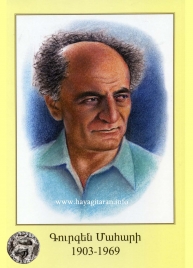Gurgen Mahari
Tuesday, April 23, 2019
Gurgen Mahari (Gurgen Grigori Ajemian; August 1, 1903 in Van – June 17, 1969 in Yerevan) was an Armenian writer and poet. His most significant works include the semi-autobiographical novella Barbed Wires in Blossom (1968) and the novel Burning Orchards (1966), which is set in the writer's hometown of Van on the eve of the Armenian Genocide.
Gurgen fled to Eastern Armenia in 1915 during the Armenian genocide and found refuge in orphanages in Etchmiadzin, Dilijan, and Yerevan. His first book, Titanic, was published in 1924. He then wrote his autobiographical trilogy (first part, "Childhood" was published in 1929, and the third part was finished in 1955) which tells the story of his survival and the tragedy experienced by the Armenians of Western Armenia.
He was arrested in 1936, during the Stalinist purges and sentenced to 11 years imprisonment in Siberia. He was released in 1947, but a year later was again arrested and sent into Siberian exile as an 'unreliable type'. He was allowed to return to Yerevan in 1954 following Stalin's death.
He is also the author of Charents-name (1968), memoirs about Armenian poet Yeghishe Charents, and of Barbed Wires in Blossom, a novella based largely on his personal experiences in a Soviet gulag.
Works in translation
- Mahari, G. (2007) Burning Orchards, translated by D. Tahta, H. Tahta and H Ghazarian, Black Apollo Press, Germinal Productions, Cambridge, U.K. ISBN 978-1-900355-57-5





